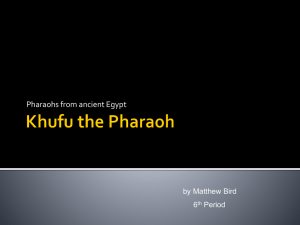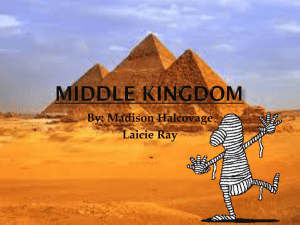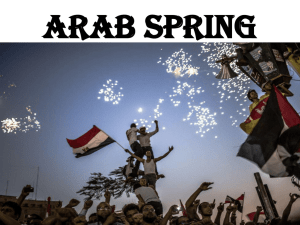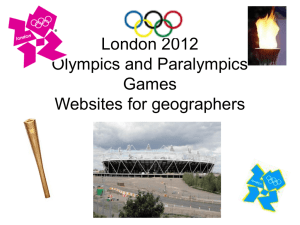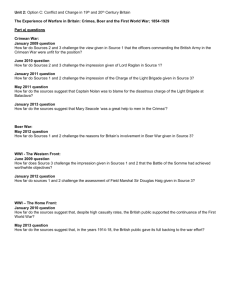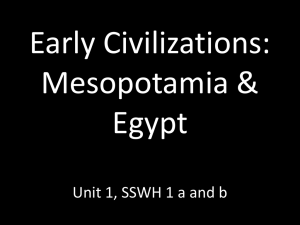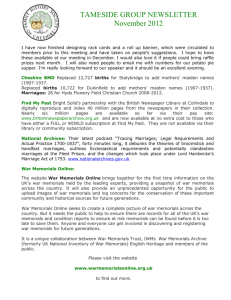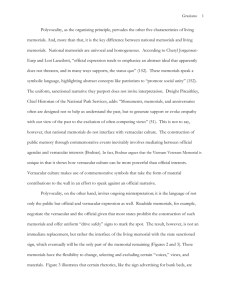PPT: Using Memorials - British Foreign Policy
advertisement
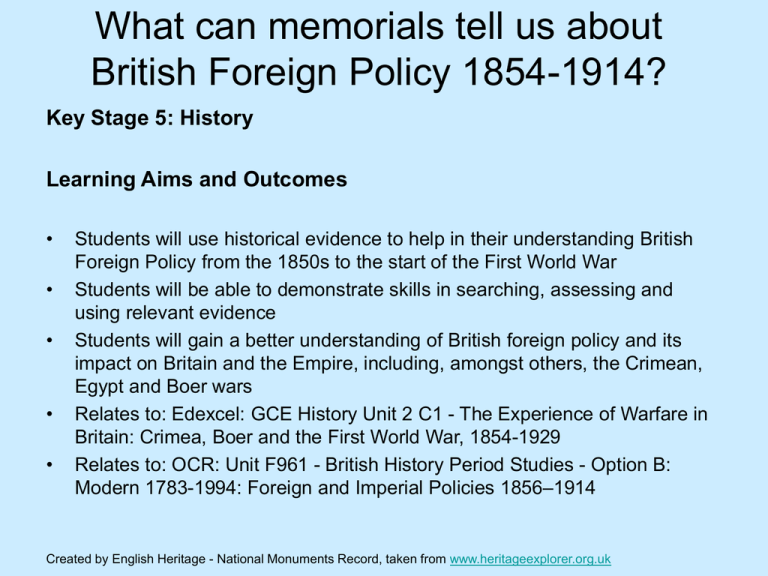
What can memorials tell us about British Foreign Policy 1854-1914? Key Stage 5: History Learning Aims and Outcomes • • • • • Students will use historical evidence to help in their understanding British Foreign Policy from the 1850s to the start of the First World War Students will be able to demonstrate skills in searching, assessing and using relevant evidence Students will gain a better understanding of British foreign policy and its impact on Britain and the Empire, including, amongst others, the Crimean, Egypt and Boer wars Relates to: Edexcel: GCE History Unit 2 C1 - The Experience of Warfare in Britain: Crimea, Boer and the First World War, 1854-1929 Relates to: OCR: Unit F961 - British History Period Studies - Option B: Modern 1783-1994: Foreign and Imperial Policies 1856–1914 Created by English Heritage - National Monuments Record, taken from www.heritageexplorer.org.uk STEP 1: Go to www.heritageexplorer.org.uk Select Search from the left-hand menu Type war, memorial into the Keywords box. Then select Victorian (1836-1901) from the dropdown list under When STEP 2: Open each of the thumbnails to find out more about the memorials. As you read them create two lists. One of the countries they were fought in and another of the names of the wars / Reasons for being there Share your lists with the class: Victorian War Memorials Name of Country Name of War/Reason for being there STEP 3: Repeat your search: selecting Edwardian (1902-1913) Use these results to add to your list of wars and countries Share your lists with the class: Edwardian War Memorials Name of Country Name of War/Reason for being there Your list should look something like this Name of Country Name of War/Reason for being there Ukraine (Russia) Crimean War (1853-6) India Indian Mutiny (1857-9) Sierra Leone Crown Colony/ Naval Station Jamaica Crown Colony/ Naval Station South Africa Kafir War (1877-8) & Zulu War (1879) Afghanistan Second Anglo-Afghan War (1878-80) Egypt Egypt War (1882) Sudan Egypt War (1882) South Africa Boer War (1899 - 1902) North China Boxer Rebellion (1900) STEP 5: Use an atlas or online world map to mark all the countries from your list onto this map of the world STEP 6: Discuss the map - what kind of a picture of British Foreign Policy is beginning to appear? http://www.freeworldmaps.net/political.html Whilst it is clear from the numbers of memorials that the Crimean War and the Boer War were the two main conflicts during this period, your lists should also raise some interesting questions: ? Why did 329 members of the 66th Berkshire Regiment give 'their lives for their country at Girisk, Maiwand and Kandahar during the Afghan campaign 1879-80' ? Why were sailors on HMS Centurion 'killed or died of wounds received whilst gallantly doing their duty in the Naval Brigade, North China, 1900'? ? Why did 44 'Officers and Men of H.M.S. Trident' die of yellow fever in Sierra Leone? STEP 6: Divide into groups - each group should choose a different country from the list and research it. You must try to answer the following questions: • What were the British doing there? • What did they stand to gain? • What did they stand to lose? • How might this action fit in with the other conflicts? • Why did someone bother to build a memorial? Use text books and the internet to find out more about each conflict (see tables below for some interesting links - if you need them) Name of Country Name of War/Reason for being there Ukraine (Russia) Crimean War (1853-6) India Indian Mutiny (1857-9) http://www.nationalarchives.gov.uk/battles/crimea/ http://www.timesonline.co.uk/tol/archive/tol_archive/article496367.ece http://www.loc.gov/pictures/search/?st=grid&co=ftncnw http://www.bbc.co.uk/programmes/b00qprnj http://www.britishempire.co.uk/forces/armycampaigns/indiancampaigns/muti ny/mutiny.htm Sierra Leone Crown Colony/ Naval Station http://www.bbc.co.uk/history/british/abolition/royal_navy_article_01.shtml http://www.royalnavalmuseum.org/visit_see_victory_cfexhibition_infosheet.h tm Jamaica Crown Colony/ Naval Station http://hansard.millbanksystems.com/commons/1874/jun/18/question Name of Name of War/Reason for being there Country South Africa Kafir War (1877-8) & Zulu War (1879) http://stmarys.ca/~wmills/course322/Kaffir_wars.html http://www.bbc.co.uk/history/british/victorians/zulu_01.shtml Afghanistan Second Anglo-Afghan War (1878-80) http://news.bbc.co.uk/local/berkshire/hi/people_and_places/history/newsid _8225000/8225507.stm http://www.dailymail.co.uk/news/article-1229067/One-British-soldiersdiaries-bloody-battle-Afghanistan-130-years-ago-provide-haunting-insighthorrors-troops-face-now.html Egypt Egypt War (1882) http://www.nationalarchives.gov.uk/battles/egypt/ http://www.old-merseytimes.co.uk/egypt2.html Sudan Egypt War (1882) http://www.nationalarchives.gov.uk/battles/egypt/aftermath.htm http://www.victorianweb.org/history/empire/gordon/bio1.html Name of Country South Africa Name of War/Reason for being there Boer War (1899 - 1902) http://www.bbc.co.uk/history/british/victorians/boer_wars_01.shtml #six http://www.redcross.org.uk/About-us/Who-we-are/Museum-andarchives/Historical-factsheets/Boer-wars North China Boxer Rebellion (1900) http://history.cultural-china.com/en/34History6705.html http://www.bbc.co.uk/programmes/b00j4hmv http://www.bbc.co.uk/learningzone/clips/the-boxerrebellion/8056.html http://www.economist.com/node/17723014 STEP 7: Each group should share their research with the rest of the class. Then each student should return to the original question: What can memorials tell us about British Foreign Policy 1854-1914? Write a short essay summarising your findings and use them to answer the question above

